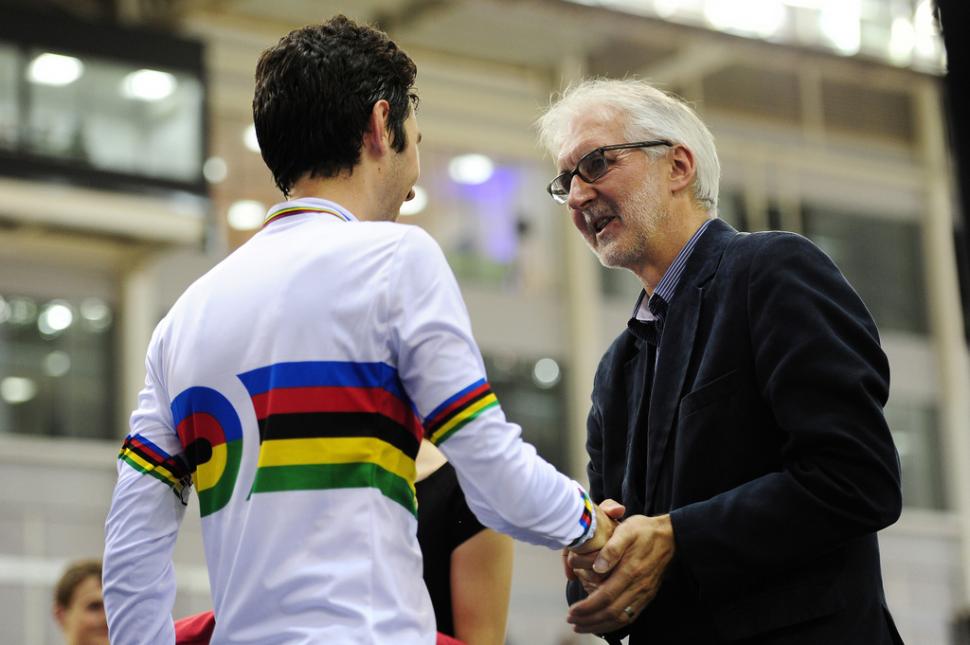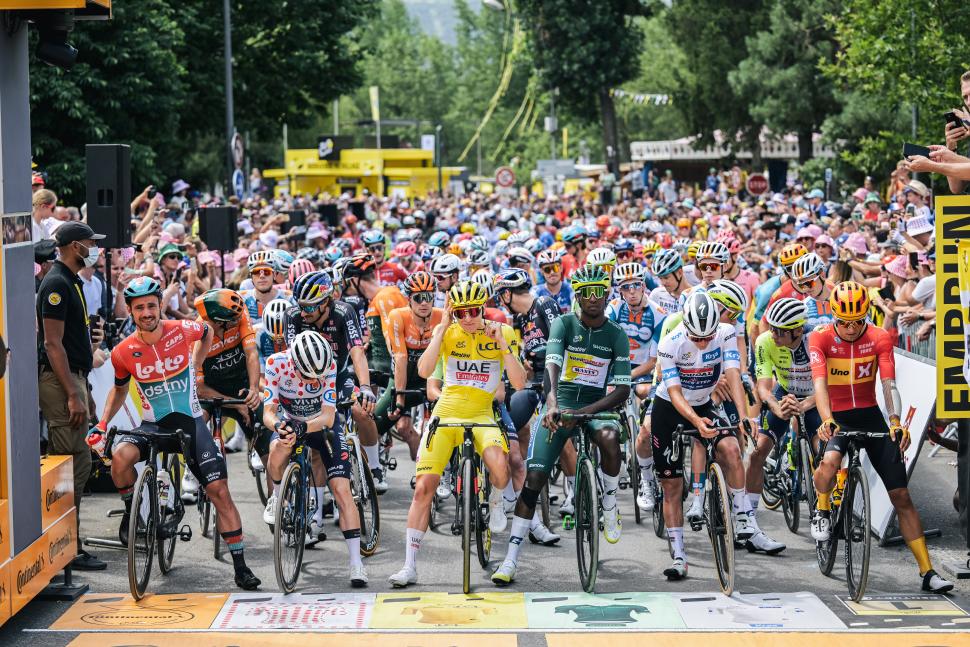- News
- Reviews
- Bikes
- Accessories
- Accessories - misc
- Computer mounts
- Bags
- Bar ends
- Bike bags & cases
- Bottle cages
- Bottles
- Cameras
- Car racks
- Child seats
- Computers
- Glasses
- GPS units
- Helmets
- Lights - front
- Lights - rear
- Lights - sets
- Locks
- Mirrors
- Mudguards
- Racks
- Pumps & CO2 inflators
- Puncture kits
- Reflectives
- Smart watches
- Stands and racks
- Trailers
- Clothing
- Components
- Bar tape & grips
- Bottom brackets
- Brake & gear cables
- Brake & STI levers
- Brake pads & spares
- Brakes
- Cassettes & freewheels
- Chains
- Chainsets & chainrings
- Derailleurs - front
- Derailleurs - rear
- Forks
- Gear levers & shifters
- Groupsets
- Handlebars & extensions
- Headsets
- Hubs
- Inner tubes
- Pedals
- Quick releases & skewers
- Saddles
- Seatposts
- Stems
- Wheels
- Tyres
- Health, fitness and nutrition
- Tools and workshop
- Miscellaneous
- Cross country mountain bikes
- Tubeless valves
- Buyers Guides
- Features
- Forum
- Recommends
- Podcast
news
 Brian Cookson at 2013 Junior World Track Championships (credit Brian Cookson Images, Flickr)
Brian Cookson at 2013 Junior World Track Championships (credit Brian Cookson Images, Flickr)“Can you imagine any retailer of any other product getting away with that?” Ex-UCI president Brian Cookson uses baked beans analogy to hit out at “outrageous and incompetent” Warner Bros. Discovery for “trying to kill cycling for British customers”
The backlash to Warner Bros. Discovery’s controversial decision to close down Eurosport in the UK and Ireland and shift its cycling coverage to the £30.99-a-month TNT Sports channel continues to rumble on, amid reports that pro teams and sponsors have raised concerns that the move could lead to a substantial drop in viewership in a key market.
Eurosport’s closure at the end of February, after over three decades of broadcasting in the UK, comes as Warner Bros. Discovery integrates all the channel’s content onto its main TNT channels, meaning cycling will now be broadcast on TNT Sports rather than Eurosport and, as it is already, available to stream on discovery+.
However, Discovery’s longstanding integration project – which was cited as the key factor behind the demise of cycling-specific streaming platform GCN+ in late 2023 – also means that cycling fans will now have to pay a £30.99-a-month premium discovery+ subscription to watch bike races on TNT, a package which includes the channel’s other sports coverage, such as Champions League and Premier League football.
(ASO/Charly Lopez)
That £371.88-a-year package is a whopping 443 per cent more expensive than Discovery’s previous £6.99-a-month basic subscription, a price hike that has understandably been condemned by fans, who have branded it “exploitation” and a decision that will “destroy our sport”.
> How to watch cycling for less now it's moving to £30.99-a-month TNT Sports
The news that watching bike races in the UK and Ireland is about to get a whole lot more expensive has also been criticised by some riders and pro cycling stakeholders, with former UCI and British Cycling president Brian Cookson the latest to weigh in on cycling’s controversial transfer to TNT – by comparing it to buying baked beans at the shop.
As we first reported on the live blog, Cookson, who held the top position at the UCI between 2013 and 2017, took to his LinkedIn page when the news broke last week to criticise the “outrageous and incompetent mishandling of this by Eurosport/Discovery/Warner Bros.”, asking: “Are you trying to kill cycling for your British customers?”
Then, responding to road.cc’s story on the fans threatening to report Warner Bros. Discovery to the UK market regulator for “abuse of monopoly” and “price gouging”, Cookson later suggested: “So maybe this is not going to be quite so easy for WBD.”
In another post, Cookson – inspired, perhaps, by his weekly shop – said: “Here’s an alternative way to look at this. I like a particular brand of baked beans, which I can buy at a number of different supermarkets at a reasonable price. I don’t like any other beans or any other sort of canned vegetables.
“Now I find that in future I am only going to be able to buy these beans from one particular supermarket, and I will have to buy several other brands of beans and canned vegetables that I don’t like and don’t ever eat.”
The former British Cycling president continued: “Can you imagine any retailer of any other product getting away with that? Can you imagine that company and people in that industry telling the people who objected that they just didn’t understand that industry?
“I think the many people who are objecting to this move by WBD to scrap Eurosport in the UK and Ireland, to package its coverage of sports like cycling in with sports we don’t wish to watch, whilst hiking up the price for this combination by a ridiculous amount, well, I think we understand it very well indeed. And we don’t like it.”
Cookson’s comments come after several cycling fans told road.cc that they had reported Warner Bros. Discovery to Competition and Markets Authority (CMA), arguing that cycling’s move to TNT constitutes price gouging.
According to one reader who submitted a complaint to the CMA, the principal competitive regulator in the UK, responsible for promoting competitive markets and tackling unfair behaviour by businesses, Warner Bros. Discovery’s ‘integration’ policy represents an “abuse of a monopoly position”.
“I, like many, am flabbergasted at the Discovery+ change to cycling coverage,” Ben Taylor told us last week. “I’ve reported them to the Competition and Markets Authority for abuse of a monopoly position, quoting the price increases since they built that position.
“I would encourage others to do the same. If we hit the CMA with lots of demands, it’s more likely that they’ll take action.”
(ASO/Charly Lopez)
Meanwhile, Escape Collective have reported this week that some professional teams are preparing to state their concerns about the price hike set to impact British and Irish fans, which they believe will lead to a massive drop in viewership in a key market, along with the loss of free-to-air Tour de France coverage in the UK from 2026.
The website also reported that, with cycling being placed behind an ever-larger paywall in the UK, One Cycling – the Saudi investment fund-backed group which aims to ‘revolutionise’ the sport by streamlining its race calendar and overhauling its business model – is considering creating a specialised live cycling streaming service, in the style of the now defunct GCN+.
Described by a source as a “medium to long-term ambition”, One Cycling’s ‘media hub’ would see the group acquire the rights to broadcast all televised races “directly to the consumer”, cutting out what it describes the “middlemen” broadcasters, therefore placing more power – and money – in the hands of the teams, at least in theory.
After obtaining a PhD, lecturing, and hosting a history podcast at Queen’s University Belfast, Ryan joined road.cc in December 2021 and since then has kept the site’s readers and listeners informed and enthralled (well at least occasionally) on news, the live blog, and the road.cc Podcast. After boarding a wrong bus at the world championships and ruining a good pair of jeans at the cyclocross, he now serves as road.cc’s senior news writer. Before his foray into cycling journalism, he wallowed in the equally pitiless world of academia, where he wrote a book about Victorian politics and droned on about cycling and bikes to classes of bored students (while taking every chance he could get to talk about cycling in print or on the radio). He can be found riding his bike very slowly around the narrow, scenic country lanes of Co. Down.
Latest Comments
- 🐸 41 min 45 sec ago
No it can't. With lower gears to achieve the same speed you should change more gears and make more pedal strokes. It's just not comfortable. On...
- OldRidgeback 2 hours 52 min ago
I cycle most days and have never contributed to the economy of Maidenhead either. I can't say I've ever actually been there and I live in London. I...
- David9694 3 hours 22 min ago
Police, firefighters and paramedics at Staffordshire smash as 4x4 left in ditch...
- David9694 3 hours 25 min ago
Jolly Farmers pub in Forncett Saint Mary closed after crash...
- dodgy 4 hours 56 min ago
Hard to reconcile the asking price of this, with this https://road.cc/content/tech-news/quintana-roo-unveils-new-all-speed-aer...
- Secret_squirrel 5 hours 24 sec ago
I've used Armourtex in north london if you're willing to Powdercoat. Great job. https://www.facebook.com/armourtex
- bluezurich 5 hours 30 min ago
Cycling.Today has you covered for free. Tiz does as well but the moderation over there is a bit facist. Well, a queen mod rules it so it's a...
- chrisonabike 6 hours 3 min ago
Well, on one of my uprights I have a mirror mounted but it is really too small / fitting is not secure enough. I find I just don't use it. On...
- Hirsute 7 hours 45 min ago
This highways roadwork protection vehicle should have been wearing hi viz https://www.bbc.co.uk/news/articles/clyer0ny3x7o
- matthewn5 9 hours 34 min ago
The ugliness is the dealbreaker for me.



Add new comment
20 comments
Welcome to the hell of US style cable TV.
The main reason that I have never subscribed to any pay to view channel is that it would mean paying for access to a lot of content I have no interest in, in order to view a small amount of material that I am actually interested in. This is exactly what TNT are expecting me to do in order to watch cycling on TV in future. I might have come around to paying £7 a month to watch cycling (probably not every month), but I'm certainly not going to pay £31 a month.
Sorry, I just could not finish the article. As soon as I saw figures quoted in excess of 100% I had to look away. There is nothing greater than 100%, because 100% is everything, all of it, the whole shooting match. Percentages are used to express parts of a whole; to express larger numbers, multiples are the method to use, not percentages. It's either inept use of the language, or trying to use the largest number possible in order to be hyperbolic. In either case it's nasty, sensationalist and not worth the effort to read. More fitting in tone, of a Daily Heil effort.
That's simply wrong I'm afraid, if you take a base number as a reference point then an increase above it can be expressed in terms of more than 100%. If you earn £100 a day and your salary is increased to £300 a day, your salary has increased by 200%. This is not something that's arguable or a matter of opinion, it's a simple fact accepted by all mathematicians.
While we're on the topic I've always been suspicious of these negative numbers. Where are your -3 apples, may I ask?
And as for so called "imaginary", "irrational" or "surreal" ones - I think the clue's in the name!
'Transcendental' ones too - we don't need any of that woowoo stuff.
The Pi is a lie!
You know its just maths right? Percent represents a fraction
% = a/b * 100
So if a is greater than b then the fraction is greater than 100%
Look I'll put it this way arguing that nothing can be over 100% is like saying numbers greater than one don't exist!
So yes if something is doubled it's "gone up by 100%" if it's tripped then it's "gone up by 200%".
Because we calculate
"gone up by %" = 100* (a-b)/b
In Britain we are let down by our education system in terms of numerical skills,
https://www.nationalnumeracy.org.uk/news/new-survey-uk-numeracy
The last governments intention to keep numerical skills education going across years 12 and 13 was something I agreed with.
Come on, this cannot be the first time you've seen percentages used like this? Percentages are just a way of expressing fractions/decimals on a scale of 0-100 (hence the name, literally "per cent", ie per 100), and while it's true that you cannot have more than 100% of a limited resource like a pie and cannot give more than 100% of your maximum effort, you absolutely can have 300% more pie than you had before, for example.
What about David Lappartient, Christian Prudhomme, etc... they pocket the rights for the races.
Did they sign exclusive deals with Warner Bros.
Best Bogart voice: "Ilsa, I'm no good at being noble, but it doesn't take much to see that the problems of where to watch cycling don't amount to a hill of beans in this crazy world. Someday you'll understand that."
343% only? Phew, for a minute there I thought we were being ripped off
If you're going to be ripped off, you should at least know how much you're being ripped off to the tune of.
[And once people have pointed out (more than once) that you've got something wrong, you might try getting it right.]
Just to clarify, with my ultra-pedantic mathematician & economist hat on, everything here simply reinforces the widespread suspicion that *very* few people understand percentages.
First, the comment about 100% being a limit. Well, that's right *if* you're talking about a limited resource. So, if a football manager says the team gave 150%, that's nonsense. The team can't suddenly find more skill, strength & energy than they've got. If the team gave 100% it means they gave everything they have - which would require every team member ending the match literally (not figuratively but *actually*) dead from exhaustion. This doesn't happen.
Second, the formula for working out precentage. The formula given is for the total resource, not a change. If we talk about the cost of the NHS, say, as a proportion of the total national wealth (& economists talk about such things all the time), that's the right form - in this case, the formula would be:
([total NHS budget]/[UK GDP])*100
Again, that can't be more than 100% coz we can't spend money we don't have (loans sort of count as part of GDP, & repayments are correspondingly negative GDP components - but please take my advice, don't get me started on the inadequacies of GDP as a measure of anything; however, none of this is rocket science).
Finally, the formula when we're talking about a *change* in something is (obviously):
([amount of change]/[original amount])*100
To be more precise, the percentage change in some value is:
(([new value] - [old value])/[old value])*100
which can clearly be anything at all, including far greater than 100%. Or negative if the new value is less than the old value.
In this case that's ((30.99 - 6.99)/6.99)*100 = 343%
Incidentally imaginary numbers exist & are used all the time in everyday life, although the vast majority of people wouldn't be aware of it. Press a switch, on comes a light - wouldn't work unless someone somewhere is using imaginary numbers, tho possibly without knowing it. Also, irrational numbers are definitely real. They teach you that in A-level maths. Now, that *is* rocket science!
Feel free to quote me...
And that's before you get on to the confusing business of taking the new monthly cost and converting it to an annual one, and then comparing it with the monthly figure for the old subscription. Just, why? (OK - I know why - it's to make one look BIG, while the other one looks tiny, but as well as being misleading, the difference is already significant enough that it doesn't need exaggerating.)
"It was less than 23p a day, and it's gone up to £3,718.80 a decade!"
Not only are irrational numbers real, the vast majority of real numbers are irrational. Also, almost every integer contains the digit '3'.
Not if you count the binary ones.
That's just cheating
It's the pirate life for me, mateys